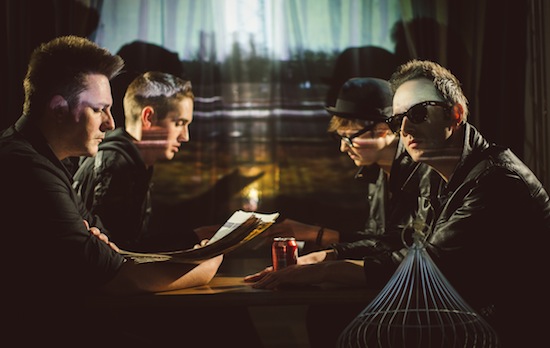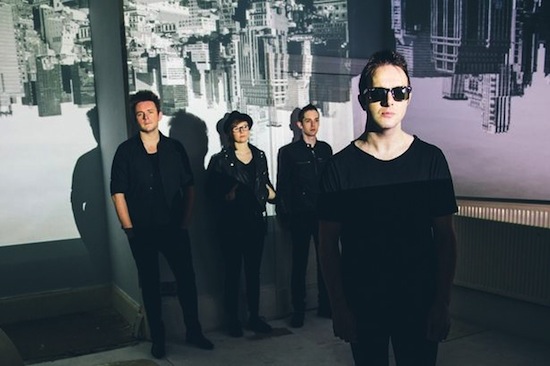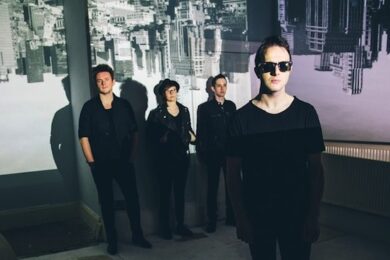On September 2, Glasvegas will release their third album Later…When The TV Turns To Static . Where 2010’s Euphoric Heartbreak was produced in LA and was sonically rich and dense, tending towards the epic, anthemic and overblown, this record is spare, stark and in places, quite bleak. Glasvegas have returned to their hometown of Glasgow, and after having parted ways with Columbia post-Euphoric Heartbreak, are on a new label, having signed to Gow Wow Records, their own imprint on BMG. We caught up with frontman James Allan to get the lowdown on where the band’s heads are at right now.
Apart from ‘If’, Later… is quite troubled sounding, and you’ve said already it seemed to be about a life that was out of kilter. There’s a lot of loneliness, it’s quite lost in places. Was it your own life you felt was imbalanced?
JA: Um, aye. I guess whether it’s my life or my experience it’ll either be that, or it’ll be my perception of something. ‘Youngblood’ has a kind of apocalyptic feel and some sense of danger, almost, and that song could have probably been written in a different light, with a different pair of eyes. If I see something in a different light a few years from now I maybe wouldn’t have wrote it with that sense of danger or that sense of trouble or that same sense of almost something quite broken and apocalyptic. But overall, whether the songs were about my experiences… well they were about my experiences, and if they weren’t about my experiences, they were about my thoughts on things.
‘Magazine’ sort of starts off like a love song to the idea of making idols, but then rejects distant glamour… what inspired that?
JA: I used to live across from this wee newsagents and the first thing that I used to see when I walked in would be mags and kids looking at them. Whether you buy magazines or whether you’re involved in a lot of media, or religion whether you want to be involved in it or not, you’re sort of caught in its crossfire. And I guess it was just that thing where you’re looking for something, for something to believe in, sometimes they’re a lot closer than what you think. “
Is the title track a direct follow-on from ‘Change’, the last song on Euphoric Heartbreak, which focuses on a conversation between a mother and a young man leaving a prison of some kind? You mention a correctional facility… a literal one, or more like a situation?
JA: I think that both probably applies. I mean when I wrote the song ‘Change’, and the second part to it was this song, the thing in common is that the song basically is about sort of a…(epic pause)… having maybe been through something and then being in that middle place, being on the verge of the new dawn, the next chapter. It’s that kind of in-between spot. But I guess a lot of the things about the correctional facility, a lot of the words that’s in it… it could be a physical thing, but it could be a more mental thing. The walls in your mind, almost.
It’s something that’s cropped up on all your albums, now, though, that idea of imprisonment. Why do you think that’s something you keep going back to?
JA: I think, probably, it’s no any fascination with prisons or anything. It’s probably my more… I think it’s… I don’t know why, exactly, I guess. We’ve played in some prisons. ‘Polmont On My Mind’, I wrote because we played in Polmont, and it shocked me. It shocked me being there, and later it shocked me when I left the prison. I remember talking to some of the prisoners, and they would say, what are you up to tonight? And I was like, ‘Aw, I’m going to meet my pal,’ and I couldn’t really have asked them what they were doing, y’know? And I felt like, ‘What the fuck am I supposed to do? These human beings actually are kept here. Up against their own will, and I guess that always shocked me. I think some of the things and some of the connections I can make to it myself is feeling the chains of some sort, which I’m sure everybody can feel or relate to in some sense, whether it’s physical or mental.
Euphoric Heartbreak, felt overall like it had a lot of fighting spirit. The only song that’s on the new album like that really is ‘If’.
JA: Aye, uh-huh.
…And the rest of it doesn’t really have that sort of… same seize-the-day anthemic thing quite as much. It’s like someone that tried to seize the day and got their fingers burnt, almost.
JA: Aye… It sounds like somebody that’s got their fingers burnt, you think?
Maybe? It’s just… are you sort of shying away a bit more from those sort of really anthemic songs or is it just a slightly different headstate?
JA: I guess there is a stark energy to the album and to be honest with you it’s not something that I would… I don’t think that’s one of the energies I’d particularly kind of look to put in something. But with the any of the broken nature that’s come through the album or some of the words, they seem to go quite well together and it seems to makes sense. Even if it sounds like the way you described it, I guess if you hear it like that then you must be right, I don’t really know the answer.
There’s a reference to Talking Heads’ ‘Road To Nowhere’ in there. You often have these little allusions to other artists and songs. How did that one get in there?
JA: I think that song had been on TV, so I heard it, and I was sitting there with the guitar, and I was just strumming the chords and singing some of the words. I just thought I’d put the Talking Heads thing in the middle, not as a hook or a sample, but more like a nod.
Did you know David Byrne’s actually Scottish by birth?
JA: I’ve heard that, I’ve heard he’s from Dumbarton.
Yep. Blew my mind when I found that out.
JA: Aye. Well, he’s just like everybody up in Dumbarton, really, isn’t he? I’m sure they all look like that, and they all sing like that.
They all dance like that, probably.
JA: Aye!

You said ‘Neon Bedroom’ was originally written for a female pop artist, but then you kept it for yourself. Who was it written for?
JA: No, I’m no telling you. I think it’d be funnier just to not say, because then it was like a wee secret.
I was really hoping it’d be Lana Del Rey. Was it?
JA: I should just not say, it’s better.
OK… but it must be quite difficult to write and sing something from the perspective of a teenage girl imagining adult sexuality and not have it come across as really creepy.
JA: Haha! I guess what the essence of the song is a crush, like a forbidden love, like touching something from afar. And I’m sure in some ways it’s about fantasising. And, aye it’s maybe in a creepy way, and maybe a way that’s… no sordid or anything like that, but I guess everybody’s got some touches of that in them at some points in their life. So I feel alright to sort of imagine watching somebody from afar. There’s almost something quite secretive about the song, and I’m sure there’s points in my life where I’ve no felt like a teenage girl, but I could still write the song and get into it.
‘I’d Rather Be Dead Than Be With You’ is quite difficult to listen to. Do you think of it as being as vengeful a song as it sounds?
JA: Chirpy. It’s a chirpy song. No, of course – I’m not that clever to invent that kind of fury into a song from nowhere. I wish I was that good a songwriter where I could just write the songs and have nothing to do with it. But I don’t think that I’m that good, man. But it doesn’t mean that I wake up and that’s the kind of feelings that I feel, or even when I sing the song now. Maybe I do feel it, maybe it’s changed in some way. Maybe I feel even more the fury as time goes on… But no, I guess it’s not just come from fresh air and feeling the love, y’know what I mean?
Er, no. Definitely no rainbows and kittens. Can you talk about what did inspire the song at all?
JA: It’s hard, because I guess it’s too personal, and it’s just getting into the gossip of the song and all that. A lot of the album’s just me and I can’t sidestep my own true feelings and the ways that I see things for the sake of making everybody feel comfortable. But with a lot of the songs, it’s a reflection of yourself that sometimes can be a scary one. It’s got a lot of rage.
Does being back in Glasgow make you feel more grounded?
JA: You’re not grounded. I don’t think I’ve ever really been grounded, ever. And I don’t think I’d ever really come down, I don’t think so, but I think I’m just on a different planet.
Did the break with Columbia have any effect on your sense of purpose with the band?
JA: Nah, it didnae really have any… see from our point of view, it was maybe different because we’d already had a big audience, and a platform… it was almost like it was a formality, which makes me maybe big-headed or quite arrogant or whatever…even no working with them, I thought, well, we’ll just make an album and we’ll just sign to another big company and then we’ll just put it out. And that’s what we’ve done. I think for a band that was starting out, these things would probably affect them, but it was different for us. Somebody asked me that in an interview today, and then in the same interview they said, ‘There was a few things, like V Festival…’ [where the band got ‘bottled’], and I was like ‘See the V festival’, somebody threw like two bottles or something, and I got pissed off with it, and I wanted to tell somebody that that was pretty rude. And then it seemed like this big thing. Sometimes on the surface of things, when things appear to be really bad, sometimes underneath, they’re actually no that bad. And then the opposite, when things on the surface seem to be so amazing, sometimes underneath they can be the darker times. But I guess the Columbia thing didnae really seem to make a difference. I was looking forward to a fresh start, new people. And maybe it won’t always be like that, maybe one day I’ll be like ‘Oh, we’ll just go and we’ll make a record with somebody else or whatever’ and it won’t be as easy as that. But that’s just my mentality and that’s the way I’ve always been. I was like that even when I was unemployed, man. I just had a feeling that, the songs, people were gonna become aware of it.
How do you feel about the future of the band, and this album, now?
JA: It always feels like the start. It’s the unknown. And I don’t always mean in a nice wee exciting way. I have always said that even from first record there was never a guarantee that I would make another one. I really don’t know, and the band know that. ‘Cos nothing’s certain with anything, marriages and stuff like that. They sometimes just don’t work out, sometimes they do. I don’t know what lies ahead but I guess I just hope for all those things. And I guess I just hope that the band’s sense of optimism and safety and happiness and all that kinda stuff, I hope that they’ve got that. I guess it’s all quite the unknown, and it is exciting man, because it’s just a mystery. So I don’t know. It’s scary as well. But it’s the same for everybody, innit?




